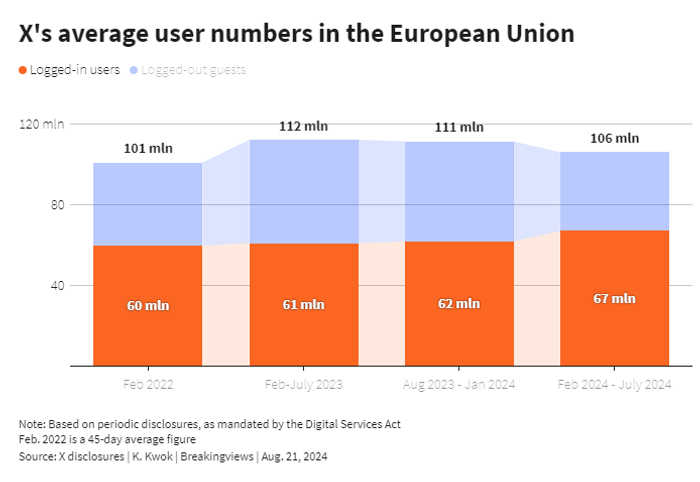Published 19:22 IST, August 21st 2024
Elon Musk’s best move in EU fight may be an eXit
Breton took the unusual step of reminding Musk publicly about the DSA on X, causing consternation in Brussels.
- Technology
- 4 min read

Moderating influence. Elon Musk has no easy way out of his fight with the European Commission, which is investigating whether his social-media site X breached rules designed to limit illegal content and disinformation. The billionaire is facing determined adversaries in the relevant Commissioners Thierry Breton and Margrethe Vestager, who have a new legal tool. Musk may eventually conclude that pulling the plug makes sense.
The Commission last month issued a preliminary finding that X had breached the Digital Services Act (DSA), a sprawling new piece of legislation that aims to combat harmful online content. Among other things, Brussels took issue with the site’s blue user checkmarks, which it fears bestow a false credibility on some accounts. X said it disagreed with the Commission’s assessment. Another investigation, into the way Musk’s site moderates disinformation and illegal content, is ongoing.
Breton took the unusual step of reminding Musk publicly about the DSA on X, causing consternation in Brussels but also highlighting the Frenchman’s commitment to the case. The ultimate possible penalties include fines equivalent to 6% of revenue.
Much depends on Musk. The DSA gives companies time to improve their systems before the Commission makes a final decision, leaving room to avoid charges. The Commission doesn’t expect a perfect platform that’s permanently free of hate speech or misinformation, according to a person familiar with the case. Rather, it wants to see robust processes for removing illegal posts such as ones promoting terrorism, and an overall design that aims to limit the societal risks from rampant disinformation.
The trouble is that Musk might struggle to get on board with that vision. Compared with the previous management of the company formerly known as Twitter, he has shown a more permissive attitude to controversial posts. A May report by the European Commission said that X had slashed its team of content moderators by 20% since last October and only covered seven of the bloc’s 24 official languages.
X is not a signatory to Europe’s code of practice on disinformation – whereas TikTok, YouTube owner Alphabet and Facebook and Instagram owner Meta Platforms are. A September study commissioned by the backers of the code concluded that disinformation was easiest to discover on X, among the major platforms.
Musk seems unlikely to change much, having responded to Breton’s warning with a meme containing an expletive. Facing the threat of possible penalties, then, continued intransigence would point in only one direction: leaving Europe. Pulling out should be technically possible. Meta’s Threads social-media service, for example, launched initially without availability for European users.
True, ditching the bloc would mean turning away 67 million logged-in users, based on numbers in X’s latest DSA transparency disclosure. But it’s doubtful whether X would be able to make much money off them anyway. The overall company had negative free cash flow last summer, and Europe should in theory be one of its less profitable regions given the cost of complying with the DSA. Faced with the prospect of either heavy penalties or compromising on his beliefs, Musk may simply decide that the region isn’t worth the hassle.

Context News
European Union industry chief Thierry Breton told billionaire Elon Musk in a letter on Aug. 12 that he must comply with EU law, ahead of Musk's interview with U.S. presidential candidate Donald Trump on social media platform X. "Digital Services Act (DSA) obligations apply without exceptions or discrimination to the moderation of the whole user community and content of X (including yourself as a user with over 190 million followers) which is accessible to EU users and should be fulfilled in line with the risk-based approach of the DSA, which requires greater due diligence in case of a foreseeable increase of the risk profile", Breton wrote in his letter. On July 12, European Commission ruled in a preliminary finding that X had failed to comply with a DSA requirement to provide searchable and reliable information about advertisements in a library for easy access. X was also charged with blocking researchers from accessing its public data. The company, which will have several months to respond to the charges, could face a fine of as much as 6% of its global turnover if found guilty of breaching the DSA. The Commission said separate investigations continue into dissemination of illegal content on X and measures it has taken to counter disinformation. X said it disagreed with the EU's assessment on how it complies with the DSA.
Updated 19:22 IST, August 21st 2024